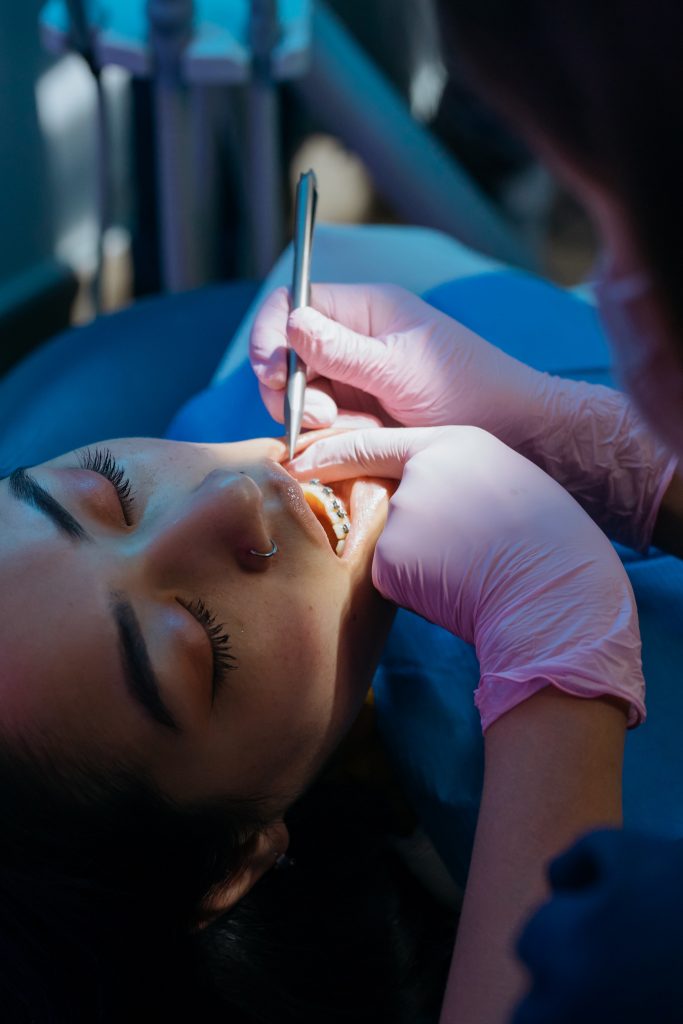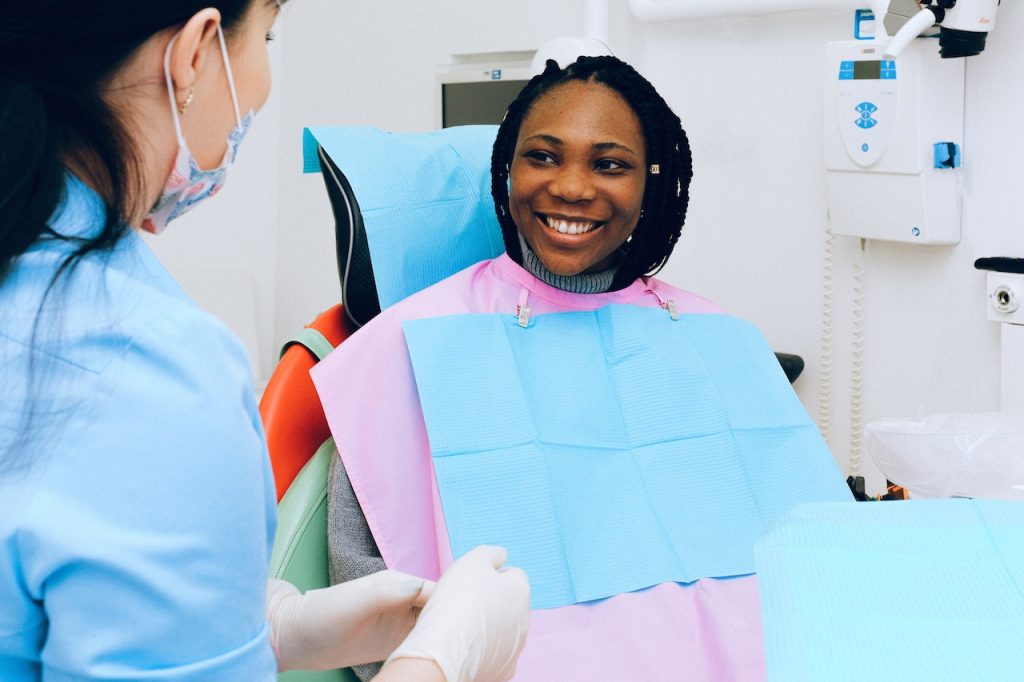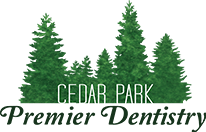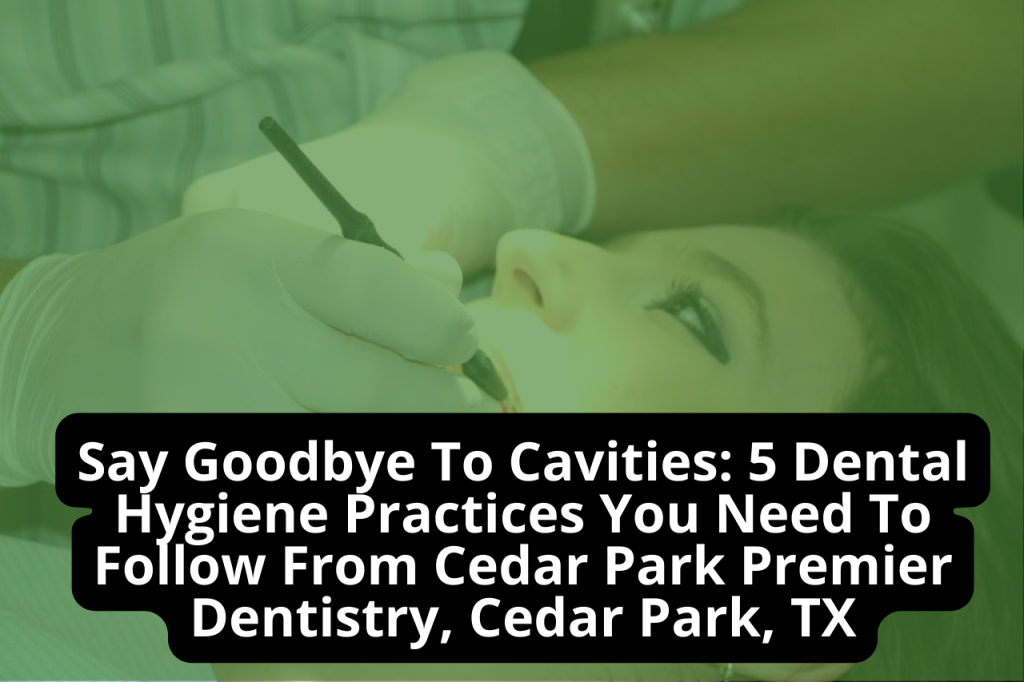Do you dread going to the dentist? You can limit your visits to necessary checkups! At Cedar Park Premier Dentistry, we believe that healthy teeth and gums should be accessible to everyone. That’s why today we’re here to talk about how you can say goodbye to cavities by following five easy dental hygiene practices.
The first step in achieving a healthier smile is understanding what causes cavities in the first place. Cavities occur when plaque – an invisible film of bacteria on your teeth – builds up due to improper brushing or flossing techniques. This build-up creates acids that break down tooth enamel, leading to painful decay and cavities if left untreated.
Now let’s discuss how you can prevent this from happening! With these simple tips from our experienced team at Cedar Park Premier Dentistry, saying goodbye to cavities has never been easier. So read on and learn more about how you can achieve optimal oral health with just a few minutes each day!
Brushing Your Teeth
Good dental hygiene starts with brushing your teeth. You should brush twice a day for two minutes each time, using an ADA-approved toothbrush and fluoride toothpaste. With gentle circular motions, clean the inside surfaces of your top and bottom teeth before moving onto the outside surfaces. Don’t forget to also brush along your gum line! Lastly, use a back-and-forth motion to brush the chewing surface of all of your molars. Taking this extra step helps remove plaque buildup that could cause cavities or even gum disease if left unchecked. Dental hygiene is essential in protecting your oral health – so make sure to brush thoroughly every single day!
Flossing Your Teeth
Now that you have brushed your teeth, the next step is to floss. Flossing regularly can help remove plaque and bacteria from between your teeth and gums where brushing cannot reach. It’s important to use a clean section of dental floss for each tooth in order to prevent the spread of oral germs. Start by winding 18 inches of dental floss around your middle fingers and holding it tightly with your thumb and index finger. Then, gently slide the floss between two teeth until it reaches just below the gum line. Move up and down the length of each side of the tooth several times before moving on to another area between two teeth. Make sure not to snap or force the string into place as this could cause damage to delicate tissue within your mouth. Doing this routine once a day will help keep cavities away!
Next, let’s discuss limiting sugary and acidic foods which are harmful to our teeth if consumed too often or in large amounts.
Limiting Sugary And Acidic Foods
It’s important to limit sugary and acidic foods for optimal dental hygiene. Sugary snacks can cause plaque buildup, leading to cavities. While acidic foods can erode the enamel of your teeth, causing them to become sensitive or discolored.
To help you limit these types of food in your diet:
– Don’t allow yourself more than one sugary snack a day
– Limit acidic beverages like soda and sports drinks
– Choose healthier snacks like fruits and vegetables instead
These simple steps will reduce the potential damage that sugary and acidic food can have on your mouth. They’ll also help keep those pearly whites strong and healthy! Plus, they’ll help you maintain good oral health overall.
With this information in mind, it is time to move on to the next step which is about using mouthwash correctly.

Using Mouthwash
Now that you have limited sugary and acidic foods, it is important to learn how to use mouthwash correctly. Mouthwash can provide additional protection against cavities by killing plaque-causing bacteria that brushing cannot reach. Using an effective mouthwash can help reduce the risk of developing cavities, bad breath, gingivitis, and other oral health issues.
When using mouthwash, make sure to rinse your entire mouth with the liquid for at least 30 seconds before spitting it out. Swirl the liquid around your teeth and tongue until all surfaces are coated before spitting it out. Be careful not to swallow any of the mouthwash as some brands contain alcohol which may cause irritation if ingested in large amounts. Regularly flossing will also ensure that food particles do not get trapped between your teeth where they can cause bacteria growth leading to tooth decay.
Mouthwashes should always be used alongside regular brushing and flossing habits for optimal dental hygiene practices. You should also visit your dentist regularly so they can evaluate whether or not you need additional treatments such as sealants or fluoride applications. Doing this will help prevent cavities from forming in hard-to-reach areas like molars and premolars.
Regular Dental Checkups
At Cedar Park Premier Dentistry, we’ve been helping folks say goodbye to cavities for generations. And one of our top recommendations is regular dental checkups. They’re a crucial part of having and maintaining good oral health.
The best way to keep your pearly whites healthy is by visiting us every six months so that we can provide preventive care like cleanings, X-rays, and exams. This allows us to spot any signs of decay or other issues early on before they become costly problems down the line! It also helps you maintain an optimal level of hygiene between visits and catch anything that could be missed with at-home brushing and flossing alone.
We understand how precious your time can be – but trust us when we tell you it’s worth taking a little out of your day twice a year to come to see us at Cedar Park Premier Dentistry! Your smile will thank you later.
Frequently Asked Questions
How Often Should I Brush My Teeth?
Brushing your teeth is an important part of caring for your oral health. It’s recommended to brush twice a day, in the morning and before bedtime, using a soft-bristled toothbrush with fluoride toothpaste. Here are three more tips to keep your pearly whites healthy:
1. Floss daily – Daily flossing helps remove plaque and food particles that brushing can miss. This will help you prevent cavities between your teeth.
2. Use mouthwash – Mouthwashes are great tools to help kill bacteria and freshen your breath. A few times a week after brushing or flossing, try swishing some antibacterial mouthwash around in your mouth for 30 seconds or so to get rid of any remaining bacteria from eating throughout the day.
3. Avoid sugary drinks – Sugary beverages like soda and sweet tea are known for causing cavities due to their high sugar content which feeds cavity-causing bacteria found in the mouth. Try drinking water instead as it’s better for both your overall health and dental hygiene!
By taking these steps each day, you’ll be able to maintain good oral hygiene habits that help you say goodbye to cavities over time! Regular checkups at the dentist are also essential – they provide professional cleanings and examination of potential problems before they become major ones down the road.
Is There An Age Limit For Flossing?
No age limit here! Flossing is essential for every person, young and old. Tooth brushing is great but it can’t take the place of flossing – so whether you’re a grandparent or just learning how to tie your shoes, get that dental tape out and start flossing!
Sometimes I think people don’t understand how important it is to floss. Not only does it help remove plaque from hard-to-reach places between teeth, but it also helps promote healthy gums and keeps bad breath away too. That’s why we always tell our patients at Cedar Park Premier Dentistry: no matter what your age, don’t skip out on flossing!
Flossing daily (or even multiple times per day) will ensure that all those nooks and crannies around your teeth are clean and free of bacteria. So if someone in your family hasn’t been using dental tape lately, remind them they’ve got nothing to lose by getting back into the habit!
Is It Safe To Use Whitening Products?
It’s important to know if whitening products are safe for your teeth before you use them. Whitening products can be a great way to brighten up your smile, but it’s essential that they’re used correctly and safely. As a dental hygienist, I’m here to help explain the risks of using these products so that you can make an informed decision about whether or not they’re right for you.
When considering any type of tooth-whitening product, it’s best to consult with your dentist first. This is because different people may have varying levels of sensitivity in their enamel, as well as other potential oral health issues which need to be taken into account. Your dentist will also be able to tell you how often it would be safe for you to use the product without damaging your teeth further.

Most over-the-counter whitening solutions contain hydrogen peroxide and carbamide peroxide, both of which can cause gum irritation or sensitivity if left on too long. It’s always recommended that when using these types of products, you follow the instructions carefully and avoid leaving them on for longer than directed. Additionally, it’s important to note that bleaching agents should never come into contact with soft tissues such as gums or lips – this could result in tissue damage!
In short, whitening products can help improve the appearance of your smile but there are certain safety measures that must be followed when using them. Be sure to talk with your dentist about any concerns or questions before beginning treatment so that you feel confident in making an informed decision regarding your oral care routine.
Can I Use A Regular Toothbrush Or Do I Need A Special One?
Having the right toothbrush can be an important part of your dental hygiene routine. Regular toothbrushes are just as effective as special ones, so you don’t have to worry about finding a specific type. You should, however, make sure that the bristles on your toothbrush aren’t too hard or stiff, and replace it with a new one every three months or when the bristles start to fray.
In addition to having the correct toothbrush for your needs, brushing twice daily is essential in maintaining proper oral health. Brushing helps remove plaque from teeth before it builds up and causes decay. When brushing, use gentle circular motions and ensure that all surfaces of your teeth are cleaned thoroughly – front and back! Make sure to also brush your tongue to get rid of any bacteria lingering there.
Finally, flossing is another key component in preventing cavities. Flossing helps reach those small spaces between teeth where bacteria can easily accumulate if not removed regularly. Don’t forget to rinse with mouthwash after brushing and flossing for optimal results! These simple tips combined with regular check-ups at Cedar Park Premier Dentistry will help keep cavities away!
Conclusion
As dental hygienists, we understand the importance of practicing good oral hygiene to maintain a healthy smile. We hope that after reading this article, you feel more confident in your ability to say goodbye to cavities and keep your teeth looking their best.
Brushing twice daily with fluoride toothpaste is essential for keeping away plaque and bacteria buildup. Flossing at least once per day will help remove food particles from between the teeth, which can cause decay if left unchecked. Whitening products should be used as directed by your dentist- too much use can lead to enamel erosion and sensitivity.
Finally, remember that prevention is key when it comes to cavity avoidance. Be sure to visit our Cedar Park office regularly so we can check on the health of your teeth and gums—we’ll work together towards beautiful smiles! Using metaphorical language here, let us all “shine bright like diamonds” by taking care of our mouths and saying goodbye to cavities!
Contact Cedar Park Premier Dentistry today to schedule your next dental appointment! Our skilled team of professionals is committed to providing personalized care and exceptional service to each and every patient. From routine cleanings and check-ups to more complex treatments, we offer a wide range of services to meet your oral health needs. Call us now at (512) 782-0821 to book your appointment and start your journey toward a healthier, brighter smile!


